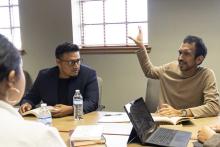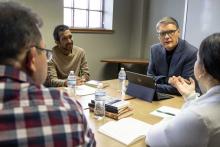Forming Partners in Ministry
Experiencing a season of growth and expansion, Truett’s Doctor of Ministry degree program has more cohorts meeting this year than ever before and looks to continue equipping leaders
When George W. Truett Theological Seminary launched its Doctorate of Ministry (DMin) degree in 1999, it did so with the aim to offer a degree that was biblical, relational, missional, and at its very heart, practical. Ministers who were serving in the field, be it in or alongside Christ’s church, were welcomed back into the academy in order to sharpen skills and deepen abilities directly aimed at impacting the Kingdom of God. During an orientation meeting of the first cohort, a student asked the first director of the program, Terry York, DMA, “Dr. York, what is the difference between a DMin and an earned degree?” York’s most benevolent of answers was, “I promise you that should you make it to graduation day, you will walk across the stage without any doubt about whether or not you earned your doctorate.” As he and York had this exchange, the other students slowly slid down in their chairs, afraid of what else might be said. From the outset, the degree was designed to have the highest academic rigor and the most applicable of interests.
Now, more than 20 years later, the program continues to offer a degree that connects missional passion to serious academic inquiry in ministry practice in an effort to engage an ever-evolving world. With more than 100 graduates since its inception, Truett’s Doctorate of Ministry graduates serve across the U.S. and abroad, and have taken their experiences into the church as well as other fields such as higher education and chaplaincy.
While much has changed over the course of its life, the degree has always been intentional about the focus not only on academic research, but also spiritual formation and relationally engaged study. Spiritual formation is the “scarlet thread” that is woven through every degree offering at Truett Seminary, but is particularly important for ministers in service to the church coming back to further their education. Isolation and anxiety are two of the most serious threats to longevity in ministry; thus, the DMin program offers a salve for each of these acute struggles through spiritual formation and the cohort model of study. The intention is for each person to graduate not only with a degree, but to be formed spiritually through the process and leave with lifelong ministry partners.
The intention of the DMin degree is for each person to graduate not only with a degree, but to be formed spiritually through the process and to leave the program with lifelong ministry partners.
Growing Presence
Over the last few years, the program has seen accelerated growth with six seminar meetings in the fall of 2022; each cohort, which is made up of a relatively small group of ministers (6 to 16), attends four seminars before beginning the research and writing phase of the program. The students then collaborate with a faculty mentor who guides the theological and biblical reflection of the project design. The work culminates in a project that is uniquely suited to the individual’s specific ministry context and interest.
At any given time, there are roughly 70 students in various stages of the DMin degree. This number represents a diversity of denominational, racial, ethnic, national, and socio-economic backgrounds. Additionally, it is not uncommon for the cohort to be multi-generational, with each person bringing a unique voice to the conversation, a voice that is heard and valued at Truett Seminary. The DMin program continues to expand locations as well, as it launched a cohort in Lubbock in fall 2022 and plans to begin a cohort at Truett’s San Antonio campus in spring 2023.
DMin in Higher Education
While congregational ministers make up the bulk of the students pursuing the Doctor of Ministry degree, there are those who are engaged in other ministry pursuits, too. One of the exciting growing edges of the work of DMin grads is found in higher education. Students and graduates who have either continued their work or have gone on to serve in the academy include Cokiesha Bailey, who is the Associate Dean of Student Diversity and Inclusion at Grace College, Kenneth Pruitt, the President of the John Leland Center for Theological Studies, and Chris Coppernoll, the Ministry Director in the Christian Union at Princeton University, to name a few. These individuals represent those who have received their doctoral training and applied their doctoral degree to higher education. Coppernoll speaks of his experience: “The faculty at Truett both challenged and mentored me. They constructed a transformative program equipping me to serve in ministry in the Ivy League.”
Even Baylor University, newly minted as a R1 research university, has been impacted by Doctor of Ministry graduates, boasting three of their own as University employees with more in the pipeline set to graduate soon. Truett’s influence on the broader Baylor campus is deepened by those people who have sought to engage the field of higher education through their research and application of projects. Baylor’s mission to educate men and women for worldwide leadership and service by integrating academic excellence and Christian commitment within a caring community continues to be shaped by those who are committed to equip God-called people for gospel ministry in and alongside Christ's Church by the power of the Holy Spirit.
"As we look to the future, not only do we envision doctoral cohorts in new places around the nation and beyond, we see God move us in the direction of new languages and ethnic minorities."
Preben Vang, PhD, Director of the DMin Program
Future Shaping
The director of the program, Preben Vang, PhD, sees opportunities for the continued growth of the program as very promising. Not only are more cohorts meeting this fall than ever before, but the promise of new locations offers this academic resource to a growing population of ministers. Additionally, partnership with Truett's Wesley House has proven to be a source of vitality as more and more Wesleyan and Methodist ministers seek to continue their education at Truett Seminary. In an age where ministering in and alongside the church seems to be increasingly complex, the DMin program is a lifeline to those ministers who are ready to engage the challenge.
As the program continues on into its third decade, the promise of the future is bright. As Vang notes, “As we look to the future, we are grateful for new opportunities to strengthen ministers in ever growing circles. Not only do we envision doctoral cohorts in new places around the nation and beyond, we see God leading in the direction of new languages and ethnic minorities. We joyfully invite other Kingdom-minded ministry leaders to join us as they find Baylor University’s Doctor of Ministry degree fruitful for their calling.”
No matter if that calling is in the congregational setting, higher education, or whatever place in which God is calling, the DMin degree program is working to prepare God-called people for gospel ministry.

